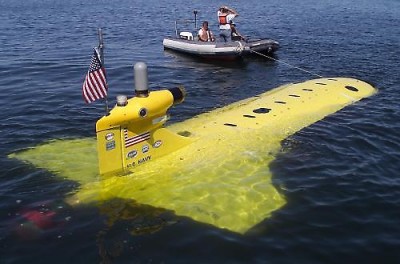American Drones for Covert Underwater Warfare against Iran

Obscuring the devastating effects of U.S. drones killing innocent civilians around the world, it is with a touch of rather inappropriate humor and enthusiasm that the military consulting company Strike Fighter Consulting speaks highly of the U.S. Navy’s new Unmanned Underwater Vehicles in its recently published article, Unmanned Drones Take to the Seas:
“It looks like drone pilots are going to need swimming lessons.
The US Navy is currently experimenting with a new breed of drone submarines in the waters next to Newport, Rhode Island. Their hope is that these drones will take the first steps (or the first doggy paddle, if you will) into a future of autonomous submarines.
These drones, which are technically known as Unmanned Underwater Vehicles (of course) could be a “game changer” for the Navy, said Christoper Egan, a program manager at the Naval Undersea Warfare Center. Every single thing that makes aerial drones so effective can just as easily be applied to submarines. (Dabney B., Unmanned Drones Take to the Seas, Strike Fighter Consulting Inc, September 19, 2012, emphasis added.)

What kind of “efficiency” are we talking about here?
Drone warfare has been mostly “efficient” in killing innocent civilians, including children, according to a study by Stanford University and New York University:
According to the new study, just one in fifty victims of the CIA programme of “targeted” drone strikes in Pakistan’s tribal areas are known militants, while between 2,562 and 3,325 people were killed in Pakistan between June 2004 and mid-September this year – of whom between 474 and 881 were civilians, including 176 children. (The News International (Pakistan), Pakistan. CIA Annihilation From The Air: Drone Warfare’s Invisible Dead, September 26, 2012)
We are told that these new “cost-efficient” underwater drones “could be used to map the ocean floor, detect enemy mines, gather surveillance, or assist in anti-submarine warfare […] The Navy hopes that the Razor would be virtually undetectable by enemy systems.” (Dabney B., op. cit.)
Earlier this year Aviation Week published an article on Large Displacement Unmanned Underwater Vehicle (LDUUV) which confirms that the underwater drone technology is well established. The new Large Displacement Unmanned Underwater Vehicle (LDUUV) is slated to be used no later than 2014:
The Large Displacement Unmanned Underwater Vehicle (LDUUV) will be large and highly autonomous, carrying out missions at long distances for months. It will act as a mothership, deploying and operating static and mobile sensors for persistent surveillance in coastal waters. Ultimately, it is likely to be armed. The program sounds ambitious, but much of the technology has already been proven.
[…]
The LDUUV will have a large payload bay, making it capable of releasing sensors, communication buoys, smaller UUS and weapons. The Navy’s current emphasis is on persistent surveillance “over the horizon.” However, its most significant impact could be in mine warfare, both offensive and defensive.
And the LDUUV could make offensive mine laying more controllable and clandestine. In the transformational mine concept, the LDUUV lays networked sensors across a wide area. These track and identify every vessel within range. Depending on the situation, any vessel can be engaged, by either an anchored weapon or a torpedo from the UUV itself.
[…]
The Navy plans to release a request for proposals for the LDUUV in 2014. Last October Rear Adm. Barry Bruner, the Navy’s undersea warfare director, indicated that up to 10 LDUUVs would be procured. The LDUUV is being pitched as a helper to complement manned submarines. However, if it achieves the technology goals for endurance and autonomy, it will pose serious questions of what exactly large unmanned craft could not ultimately do. (David Hambling, Large Displacement Unmanned Underwater Vehicle Steaming Ahead, Aviation Week, April 1, 2012, emphasis added. )

If this technology has been proven, it can be used for underwater warfare.
Will unmanned armed submarines be used for “clandestine mining” against Iran in the Persian Gulf?
Reports confirm, in this regard, that military exercises are currently (September 2012) being conducted near Iran’s territorial waters, and are “intended to simulate Iran’s response to a US-Israeli attack, namely what actions will be taken by allied forces in response to military retaliation by Iran”. (Michel Chossudovsky, “Warship Diplomacy”: A Prelude to All Out War against Iran?, Global Research, September 26, 2012.)
Underwater drones are part of the war games, Bloomberg reports:
“The BAE Systems Plc (BA/) 25mm guided ‘‘Mark 38 Mod 2,” and Kingfish unmanned underwater vehicle are among the programs the Pentagon this year accelerated under a “Fast Lane” initiative to counter Iranian naval weapons. One of the most serious threats, the Navy says, are Iranian speedboats that can employ “swarming” tactics.” (Bloomberg, September 19, 2012. emphasis added. )
A recent statement by the Director of Research of the Neocon think tank Washington Institute for Near East Policy has suggested that the US should provoke Iran into “firing the first shot”.
“We are in the game of using covert means against Iranians. We can get nastier at that […] The United States—along with as many international partners as it can mobilize—should move to more forceful action, be it covert or overt, publicly proclaimed or deniable.” (Patrick Clawson, cited in Michel Chossudovsky, Neocon Washington Think Tank: The US should Provoke Iran into “Firing the First Shot”, September 26, 2012.)
Underwater drones seem to constitute the perfect weapon to be used in acts of provocation.
__________________________________________________________________________________________________________________________
New Books from Global Research



